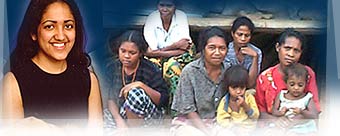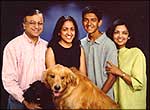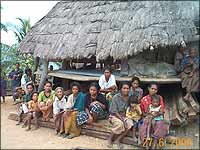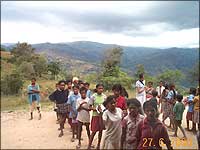The Rediff US Special/ Arthur Pais


Pooja Kumar often has a hard time explaining to people why she
might take a year off before starting on a medical degree at Harvard
University.
It is not as if she is going globe trotting or to meditate in an ashram.
On the other hand, she is weighing the possibility of doing another round of
humanitarian work in a developing country.
This young woman says she does not want to be just another doctor. She wants
to pursue a career in medicine and public health policy, she adds.
And her work with the destitute people in Calcutta and the refugees
in East Timor was geared towards that goal. Hence she feels a repeat of such a project, at yet another Third World locale, would be worthwhile.
One of the most honored students at Duke University, where she
designed her own major in Health Policy and Social Values, Pooja
was chosen as one of 20 top-notch students by USA Today
newspaper this year. Glamor magazine chose her among its top 10
women finalists last year.
Citing her passion for working for the poor and her academic
excellence, David McClay, her biology professor says, "It is this rare
combination of caring and intelligence that promises important
contributions to health and better life in the Third World."
Pooja says her passion for education, literature and social work grew on her naturally. "Science and stories have always been two of my academic loves," she says.
"I grew up to the tune of Indian myths, Indonesian fables, and Canadian tales. On a parallel, my interest in science blossomed, as my family moved from country to country and I moved from school to school," she continues.
 Her father, Suresh Kumar is an international vice president for Johnson and Johnson, while her mother Sheila is a marketing research director at the same firm. Pooja was 13 when her family (Right: Pooja with her parents and brother) moved to America and settled down in Randolph, New Jersey, in 1994 before moving to neighboring Pennsylvania.
Her father, Suresh Kumar is an international vice president for Johnson and Johnson, while her mother Sheila is a marketing research director at the same firm. Pooja was 13 when her family (Right: Pooja with her parents and brother) moved to America and settled down in Randolph, New Jersey, in 1994 before moving to neighboring Pennsylvania.
Her parents never told her or her younger brother what careers they should look for.
Pooja says her choices are often shaped by life experiences.
"At Duke, my interest in science has grown into something larger, shaped by the story of a woman whose name I never knew."
Some years ago she spent a summer under the sweltering sun of Calcutta, working with Mother Teresa’s nuns.
"Awed as I was to be in her presence, it was another little old lady (who I called Baaji, or "grandmother" in Hindi) who changed my path," she recalls.
"In the tumult of my first few days at Mother Teresa’s Prem Dan center , I was surrounded by the sick, the dying, and the destitute... suffering I had never been so close to before." Pooja continues.
" I was applying some medication to Baaji’s burned hands when she suddenly put her arms around me and started crying. In Bengali, she wept: "I keep calling out to God, but he doesn’t come ... doesn't he hear me? Why can’t he come and take me away?"
Pooja has not been able to forget the encounter.
With just fifty cents a day ("something we take for granted in America"), Baaji could have met some of her basic needs, Pooja kept thinking.
"I came to Duke shaken by Calcutta and with Baaji's story in my mind," Pooja continues. "As a student I searched for a way to change her condition. I wanted to go back one day and be able to personally treat people like her, as well as to learn how health delivery structures could be built and run to prevent such a systemic lack of care that Baaji faced."
 Two summers ago, Pooja traveled to Taiwan on a research grant to study that country’s recent shift to National Health Insurance (NHI) from a previously fragmented system of care.
She also conducted research at hospitals and volunteered at St Anne’s, a clinic for severely retarded children.
Two summers ago, Pooja traveled to Taiwan on a research grant to study that country’s recent shift to National Health Insurance (NHI) from a previously fragmented system of care.
She also conducted research at hospitals and volunteered at St Anne’s, a clinic for severely retarded children.
Back at Duke she plunged herself into coursework in science and literature, she says, "enjoying the pull and push but still searching for a major that would incorporate my interests in public health, policy, and values."
But as much as she was enjoying her medical research -- particularly the study in the genetics of autism, she was not neglecting her other passion -- literature.
This summer she spent three months at Oxford University studying British Romantic Era literature and poetry.
"Literature remains for me a strong personal interest and something that gives me acute insight into human thought and experience," she says.
Her parents, she says, appreciate her goals. But it was not easy to convince them to let her take that trip to East Timor (Above left: A discussion group on maternal and child health at a village called Hamrik Mesak in
in East Timor). "But once I explained to them that the situation had become far less dangerous than a few months ago," she continues, "and the United Nations troops were on ground, they let me go."
She led a team to Gugleur, a remote rural village in militia territory, where she worked for three months with returning refugees, who were living under United Nations tarpaulins, over the burned foundations of their former houses.
"I was struck by how even the most simple health measures are destroyed by the ravages of war, leaving the most vulnerable victims of conflict and disaster with no recourse," she says.
But she wasn’t going to despair.
 "My academic work has always drawn inspiration from the work I do with my hands, and my summer in East Timor (Right: Pooja conducts a survey at an East Timorese school) was a "practical capstone for years of study," she says. She worked at clinics and in villages and put into practice her interdisciplinary understanding of health to design a national maternal and child health outreach program that is currently undergoing funding review.
"My academic work has always drawn inspiration from the work I do with my hands, and my summer in East Timor (Right: Pooja conducts a survey at an East Timorese school) was a "practical capstone for years of study," she says. She worked at clinics and in villages and put into practice her interdisciplinary understanding of health to design a national maternal and child health outreach program that is currently undergoing funding review.
This year, her honors thesis uses her work in East Timor as a prototype for a larger study of refugee child health issues.
Her sojourns in Calcutta and East Timor have strengthened her career resolution.
"I want to be a doctor working with my hands to treat patients in an international health setting," she says, "and a policy-maker using this first-hand medical knowledge to design and implement health relief programs in emergency situations."
As a second generation Indian American, what could she tell the younger generation?
"Be yourself, find what's important to you, and go after it," she says. "For me, I found this in international health. It's very important to find what you're passionate about, and to follow it. You'll naturally become more involved and interested in the world around you.
"Be open to people and ideas. Read a lot about the world."
Design: Dominic Xavier
Back to top
Tell
us what you think of this feature